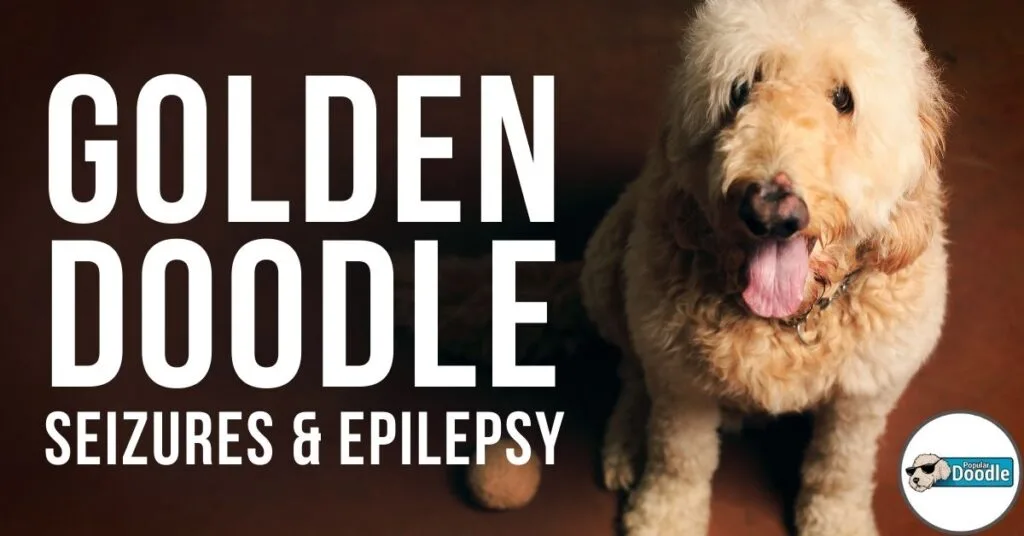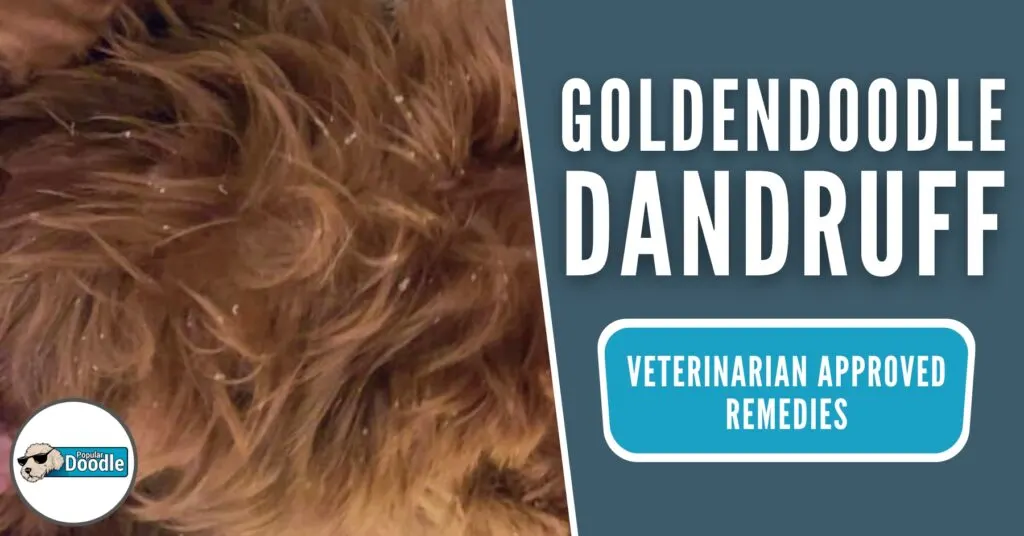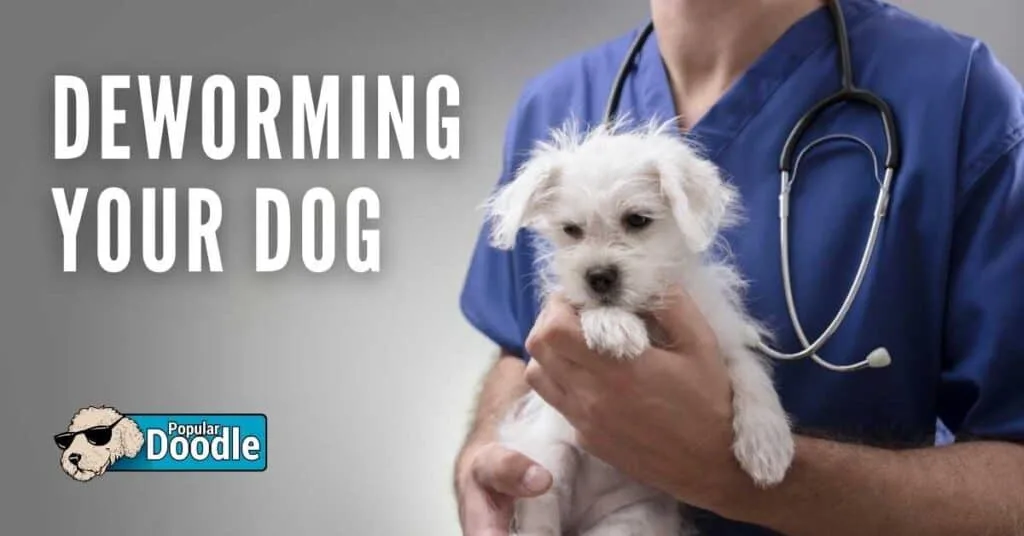By Dr. Merliza Cabriles, D.V.M.

Goldendoodle seizures can be a very alarming sight to witness. This is even more true when it’s your pet on the floor with legs stretched out, twitching and flailing uncontrollably.
Seizures or epilepsy is one of the most commonly reported neurological conditions in dogs. It can also be referred to as a fit or convulsion.
A Goldendoodle seizure is a temporary involuntary disturbance of the normal function of the brain that is generally accompanied by uncontrollable muscular activity.
Are Goldendoodles Prone to Seizures?
Genetics plays an important role in the development of seizures in dogs. Goldendoodles have a higher risk of experiencing seizures because both of their parents—Golden Retrievers and Poodles—are predisposed to the condition.
Related: Goldendoodle Health Issues: 10 Common Goldendoodle Health Problems to Look Out For!
Are Goldendoodles Prone to Epilepsy?
Being a mixed breed, Goldendoodles are prone to the same genetic issues that their parents are predisposed to.
Both the Poodle and Golden Retriever breeds are known to have higher risk of developing epilepsy, therefore Goldendoodles are at an elevated risk level as well.
Purchasing pet insurance will help ensure your Goldendoodle will get the best care possible if they end up having epilepsy or other health issues throughout their life. With a policy through Healthy Paws, they’ll pay up to 90% of your dog’s veterinary bills for accidents and illnesses!
Epilepsy vs Seizures: What’s the Difference?
Although both epilepsy and seizures are often used interchangeably, Goldendoodle epilepsy refers to repeated seizure episodes. An epileptic episode can have a single or cluster of seizures. These episodes of intense muscular activity can be unpredictable or they may happen at regular intervals.
Goldendoodle epilepsy is always associated with a brain problem, while Goldendoodle seizures can also be triggered by non-brain causes, such as toxins and certain medical conditions.
What Causes Goldendoodle Seizures?
There are several causes of Goldendoodle epilepsy and seizures:
Genetic or Hereditary Epilepsy (Idiopathic Epilepsy)
Recurrent seizure episodes in 1 to 5-year-old dogs with no abnormality in brain structure and function, exposure to toxins, or metabolic diseases, are often assumed to be idiopathic epilepsy.
It is also called idiopathic epilepsy because in some cases, the cause can’t be identified and is assumed to be genetic in origin.
The cause of these epilepsy episodes is often thought to be hereditary particularly when a parent or both parent breeds are known to be predisposed to the genetic condition like Goldendoodles are.
Structural Epilepsy
This type of epilepsy occurs when there is brain damage or malformations. Some of the most common causes include inflammatory disease of the brain, the presence of an intracranial tumor, or trauma to the head.
It can also occur as a result of stroke, embolism, or other types of vascular events that affect the brain.
Dogs diagnosed with structural epilepsy also exhibit neurological signs between seizures.
Epilepsy of Unknown Cause
This diagnosis is often made when a structural problem in the brain is suspected to be causing the seizure episodes but has not been identified.
Reactive Seizures
This type of seizure is caused by exposure to specific stimuli, such as a toxin or metabolic problem. Experts don’t consider reactive seizures to be a form of epilepsy because they are not caused by a problem in the brain.
Some of the most common underlying causes of reactive seizures include:
- Medications – ibuprofen, ivermectin, procaine penicillin G, metronidazole, isoniazid, fluoroquinolone antibiotics, phenylbutazone, and hypoglycemia-inducing medications
- Plants – certain types of mushrooms, sago palm, Brunfelsia
- Food – xylitol, caffeine, dark chocolate
- Alcohol – ethanol
- Insecticides / Rodenticides – metaldehyde, zinc phosphide, strychnine, Bifenthrin
- Illicit Dugs – cannabis, cocaine, amphetamines, synthetic cannabinoids
- Medical and Metabolic Problems – kidney disease, liver disease, electrolyte imbalance, hyperglycemia or hypoglycemia (high or low blood sugar), anemia, hyperthermia (heat stroke or heat stress), thiamine deficiency and certain nutritional imbalances, canine distemper, rabies, heartworms
What Are The Symptoms of Goldendoodle Epilepsy and Seizures?
Seizures and epilepsy in Goldendoodles can take on several forms. If you notice your dog displaying the following signs, you should contact your veterinarian immediately so you can be instructed on what to do.
- Muscle twitching
- Uncontrolled jerking movements of the body
- Falling to the side and making paddling leg motions
- Stiffening
- Loss of consciousness
- Drooling or foaming at the mouth
- Unusual eye-rolling movements
- Tongue chewing or chomping
- Involuntary defecation or urination
Your Goldendoodle may appear dazed, confused, or may keep on staring off into space right before a seizure.
After a seizure, your Goldendoodle usually appears disoriented and wobbly. They may also experience temporary blindness and may try to hide.
Have a question for a vet? Click here to live chat instantly with a verified veterinarian!
Types of Goldendoodle Seizures
Grand Mal Seizure (Generalized Seizure)
This is the most common type of seizure. An episode can last anywhere from a few seconds to a few minutes. Affected dogs can experience convulsions and can lose consciousness.
The symptoms are brought about by abnormal electrical activity affecting the entire brain.
Focal Seizure
In this type of seizure, only a part of the brain is affected by abnormal electrical activity. Affected Goldendoodles may experience twitching and uncontrollable movements on one side of the body or in one limb.
Focal seizures may last for a few seconds. Some seizures start as focal and progress to generalized seizures.
Psychomotor Seizure
A Goldendoodle experiencing a psychomotor seizure may display strange behaviors that extend for a couple of minutes. Your pet may appear to attack an imaginary object or keep on chasing his tail.
A dog with psychomotor seizures will always exhibit the same movements or behaviors every time an episode occurs.
3 Stages Of Goldendoodle Seizures
There are three recognized stages or components of a Goldendoodle seizure:
Pre-ictal Phase (Aura)
This stage occurs right before a seizure and is characterized by sudden changes in behavior. The dog may appear nervous, become more clingy, or may hide. There may also be whining, drooling, restlessness, and/or shaking. These weird behaviors may last for a few seconds to a few hours.
Ictal Phase
The various behaviors associated with seizures are exhibited by the dog during this phase which can last from a few seconds to several minutes.
The behavior changes may range from mild to a full-blown seizure (also known as a grand mal seizure). Mild changes may include a dazed look, lip-licking, mild shaking, and/or aimless staring.
A Goldendoodle with a grand mal seizure experiences loss of consciousness coupled with involuntary or uncontrollable body movements.
The dog appears to be paralyzed as he falls on his side and paddles his legs. The head is often drawn backward. There may also be drooling, urination and defecation as the dog loses control of their bowel and sphincter.
A seizure is said to be “status epilepticus” if it’s prolonged and has not stopped within five minutes. If your Goldendoodle experiences a status epilepticus, you must seek immediate veterinary attention. It’s a life-threatening situation and your Goldendoodle needs to be given intravenous anticonvulsants ASAP to stop the seizure, without which, your dog may die or develop irreversible damage to the brain.
A prolonged seizure can also cause the dog’s body temperature to rise (hyperthermia/overheating), which can also lead to difficulty breathing.
Post-Ictal Phase
After the seizure, the dog appears confused, disoriented, and restless. Salivation and pacing may also continue. Temporary blindness may be present.
What To Do If Your Goldendoodle Has A Seizure
Remaining calm while your Goldendoodle is twitching and convulsing can be difficult, but doing so can help you think clearly about what to do to prevent your dog from getting hurt.
- If your Goldendoodle is near the stairs or a piece of furniture, gently slide them away. If this is not possible, you can place something soft between your dog and the stairs or furniture to prevent them from getting hurt. Before or after a seizure, a dog may panic and run around aimlessly and may fall down the stairs or bump against objects.
- If there are other pets around, make sure that they don’t go near the dog that’s having a seizure. You may have to get them out of the room as their reactions to the event they’re witnessing can be unpredictable.
- Don’t try putting your finger near or in your Goldendoodle’s mouth or head. Remember that your dog could accidentally bite you as they lose control of their muscles. And don’t put anything in your dog’s mouth! Contrary to popular notions, dogs experiencing a seizure won’t choke on their tongue.
- Timing the seizure is important. The duration of the seizure is something that your veterinarian will want to know. If an episode is less than two minutes, it’s usually not a serious emergency. You can call your veterinarian to set an appointment so your dog can be checked. If it’s between 2-5 minutes, you should take your dog to the veterinarian as soon as possible. But if the episode lasts for more than 5 minutes, immediate veterinary attention is needed.
- Take a video of your Goldendoodle having a seizure, if possible, to show your veterinarian.
- If an episode lasts for more than a couple of minutes, the involuntary muscle movements can drastically increase your Goldendoodle’s body temperature. This can increase your dog’s risk of overheating. Turn on the air conditioning or direct a fan on your pet to cool them down. You can also place a cool washcloth on their paws.
- Talk to your Goldendoodle with a soft voice to soothe and reassure them. You should avoid petting them after a seizure because they could still bite you out of pain, confusion, or fear. As much as possible, avoid distractions around your Goldendoodle as they recover from an episode.
- Your Goldendoodle may become very tired after a seizure. Let them sleep, but make sure to keep a close eye on them.
- You may offer food and water because your Goldendoodle may experience extreme thirst or hunger after a seizure. However, don’t force them to eat or drink.
When To Call A Veterinarian?
As soon as a seizure ends, call your veterinarian. If your Goldendoodle’s seizure lasts for more than 5 minutes or they’re experiencing cluster seizures (multiple episodes within a short span of time) or don’t wake up between each episode, take your dog to the nearest emergency veterinary facility immediately.

Dr. Merliza Cabriles, D.V.M.
Contributing Professional
Dr. Merliza Cabriles is a licensed veterinarian and university professor with many years of experience in food animal and pet companion medicine. Her passion for writing as well as pet parent education and support is echoed in the articles and ebooks she has written.








